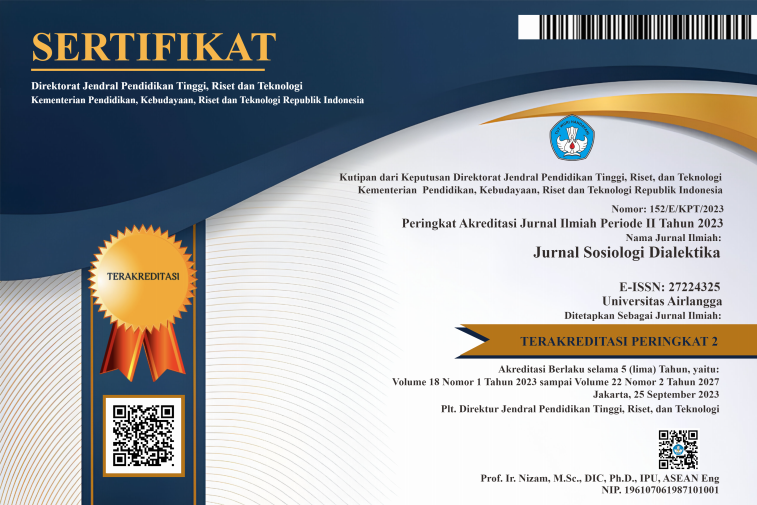Fashion trends a consumptive lifestyle in a student environment: Case study of student of the Faculty of Economics, Bengkulu University
Downloads
This study analyzes consumptive behaviour following fashion trends as a lifestyle carried out students of the Faculty of Economics, Bengkulu University. Students tend to shop according to current fashion trends rather than buying as needed. The purpose of the study was to see consumptive behaviour following fashion trends carried out by students of the Faculty of Economics, University of Bengkulu. The theoretical basis of Jean Baudrillard is used to analyze a consumptive society that is no longer bound by morality and adopted habits. The method used is a qualitative method with case studies. In previous studies, the study of consumptive lifestyles was more focused on their consumptive lifestyle and behaviour. However, this study tries to explain the consumptive lifestyle through Baudrillard's analysis of consumerism which is influenced by social relations and external factors. The results of this study are female students who behave consumptively based on the modern lifestyle. Students no longer buy goods based on the function of the goods themselves. However, it has become part of a habit that serves to demonstrate the ability to own trendy items. As for the factors behind students becoming consumptive of fashion trends, there are two, namely internal factors and external factors.
Arbaini N (2017) Gaya hidup shopaholic pada mahasiswa (studi pada mahasiswa FISIP Universitas Riau yang kecanduan berbelanja pakaian). JOM FISIP 4 (1):1-11.
Baudrillard J (2011) Masyarakat Konsumsi. Bantul: Kreasi Wacana Yogyakarta.
Baudrillard J (2017) The Consumer Society: Myths and Structures. California: SAGE publications.
CNN Indonesia (2021) Konsumen belanja online RI melonjak 88 persen pada 2021. CNN Indonesia, December 29. [Accessed 30 August 2022]. https://www.cnnindonesia.com/ekonomi/20211229141536-92-740093/konsumen-belanja-online-ri-melonjak-88-persen-pada-2021.
Creswell JW (2007) Qualitative Inquiry & Research Design Choosing Among Five Approaches. Los Angeles: Sage Publications.
Demartoto A (2009) Pembangunan Pariwisata Berbasis Masyarakat. Surakarta: UNS Press.
Efendi MR, Wahyuni S, & Zulianto M (2018) Pengaruh Facebook sebagai sosial media marketing terhadap perilaku konsumtif mahasiswa. Jurnal Pendidikan Ekonomi 12 (1):82-87.
Fauziah F (2018) Use of online shop in Instagram in women's consumptive behavior in Jakarta. Majalah Ilmiah Bijak 15 (2).
Goodman GR (2004) Sociological Theory. New York: McGraw-Hill.
Gunawan A & Carissa AF (2021) The effect of financial literature and lifestyle on student consumption behavior: Student case study Department of Management Faculty of Economics And Business Universitas Muhammadiyah North Sumatra. International Journal of Economic, Business, Accounting, Agriculture Management and Sharia Administration (IJEBAS) 1 (1):79-86.
Irkham (2012) Kenakalan remaja, petaka masyarakat konsumtif. Bangkapos.com, April 18. [Accessed 03 July 2022]. https://bangka.tribunnews.com/index.php/2012/04/18/kenakalan-remaja-petaka-masyarakat-konsumtif.
Keitharo J (2021) Perilaku belanja online di kalangan mahasiswa. Kompasiana, January 20. [Accessed 03 July 2022]. https://www.kompasiana.com/josefidkeitharo4198/6007ad378ede480d2219e382/perilaku-belanja-online-di-kalangan-mahasiswa.
Kotler A (2001) Prinsip-Prinsip Pemasaran. Jakarta: Erlangga.
Maclean J (1985) The Masses: The Implosion of the Social in the Media. Baltimore: The Johns Hopkins University Press.
Martono N (2012) Sosiologi Perubahan Sosial. Jakarta: Raja Grafindo Persada.
Mowen J & Minor M (2002) Perilaku Konsumen. Jakarta: Erlangga.
Musanna M (2018) Analisis pengaruh perilaku konsumtif mahasiswa terhadap belanja online (studi kasus belanja mahasiswa menggunakan media sosial di Fakultas Ekonomi dan Bisnis Universitas Syiah Kuala). Jurnal Ilmiah Mahasiswa FISIP Unsyiah 3 (2):224-236.
Palamba FGS (2018) Pengaruh literasi keluarga terhadap perilaku konsumtif mahasiswa Program Studi Akuntansi Universitas Sanata Dharma. Thesis, Universitas Sanata Dharma, Yogyakarta.
Paxton LA (2010) Social Capital and Political Consumerism: A Multilevel Analysis. Oxford: Oxford University Press.
Piliang YA (2004) Dia yang Dilipat: Tamasya Melampaui Batas-Batas Kebudayaan. Bandung: Jalasutra.
Sari DE, Handoko R, & Rochim AI (2018) Pengaruh online shop jejaring sosial terhadap perilaku konsumtif pada ibu rumah tangga Kabupaten Mojokerto (studi kasus ibu rumah tangga di Desa Mojotamping, Kecamatan Bangsal, Kabupaten Mojokerto). Jurnal Representamen 4 (1).
Sumarwan U (2015) Pemasaran Strategik: Perspektif Perilaku Konsumen dan Marketing Plan. IPB Pres: Bogor.
Suryani M & Achiria S (2019) Gaya hidup hedonisme dalam konsumsi ditinjau dari perspektif ekonomi Islam (pada mahasiswi Jurusan Ekonomi Islam IAIN Kota Bengkulu). Al-Intaj: Jurnal Ekonomi dan Perbankan Syariah 5 (2):238-250.
Ufrida K & Harianto S (2022) Konsumerisme makanan siap saji sebagai gaya hidup remaja di Kota Surabaya: Studi kasus siswi SMA Muhammadiyah 4 Kota Surabaya. Jurnal Analisa Sosiologi 11 (1):137-156.
Windayani S & Astiti DP (2020) Peran konformitas dan gaya hidup brand minded terhadap perilaku konsumtif mahasiswi di Kota Denpasar. Jurnal Psikologi Udayana 2:96-108.

This work is licensed under a Creative Commons Attribution-NonCommercial-ShareAlike 4.0 International License.
1. Copyright of this journal is possession of Editorial Board and Journal Manager, by the knowledge of author, whilst the moral right of the publication belongs to the author.
2. Legal formal aspect of journal publication accessibility refers to Creative Commons Attribution-NonCommercial-ShareAlike (CC BY-NC-SA), implies that publication can be used for non-commercial purposes in its original form (cannot be modified).
3. Every publications (printed/electronic) are open access for educational purposes, research, and library. Other that the aims mentioned above, editorial board is not responsible for copyright violation.















